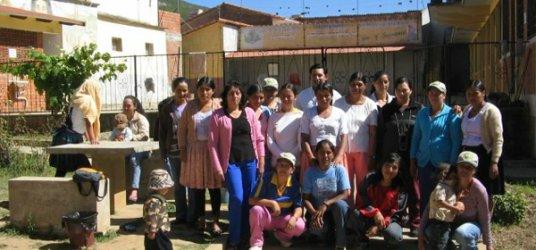
Since its launch in 2005, the Students for Development (SFD) program has been supporting senior-level Canadian university students' participation in internships for a minimum of three months in developing countries and in emerging economies.
On behalf of International Co-op, Melanie Woo got the chance to speak to Isabel regarding her SFD experience. Isabel went on the SFD program in Summer 2011 where she worked with an organization called ICO (Instituto de Capacitacion del Oriente) in Bolivia. Her internship in Bolivia was the first time she had lived and worked in a country where she did not originally speak the language, which created challenges for her. This internship opportunity offered enriching and irreplaceable experiences for her.
If you could describe your international experience in one word, what would it be?
ADVENTURE
What made you decide to do the Students for Development Program?
I have always wanted to do development work abroad and I thought applying for the Students for Development Program was a way to achieve this goal.
How did you find your international position?
I was perusing the SFU Latin American Studies website and I came across the Bolivian Specialization in CED (Community Economic Development) project. This falls under the Center for Sustainable Community Development at SFU. Every year they send some SFU students to do internship work in Bolivia. I contacted the project director, I had an interview, and a few months later I was on my way to Bolivia.
Which partner organization did you work with? What country and why?
I worked with ICO (Instituto de Capacitacion del Oriente) in Bolivia. SFU’s CED program is in partnership with AIPE, an organization of Bolivian NGOs.
How did you prepare yourself to live and work abroad?
I continued with my Spanish classes. At that time I was only at a level 2 Spanish. I did not really have a whole lot of time to prepare myself (psychologically) because my acceptance to the internship was close to the time of my departure (in 3 months). I was still busily finishing papers for my courses for that semester. Additionally, there were some requirements I had to fulfill for the Co-op summer session (courses on-line and paper work).
What did you do as an intern/researcher?
In the beginning because my Spanish language skills were not yet ‘workable’, the head of the Bolivian NGO was kind enough to suggest that I sit-in on the classes that were going on in the school for peasant farmers. These informative courses were there to help empower men and women politically and socially. Also, there were courses on sustainable agricultural practices. Although the classes were a bit boring as I really could not understand much of what was being said in the classroom, it eventually helped me get a better grasp of the language. After about a month, I felt I was ready to do a research project that the NGO had initially suggested. I then went out to do field work under the guidance of the NGO reps who knew the area well and the people I could interview.
How did you find it working in a different country?
I really did not know what to expect. I went through a lot of mixed emotions. I was excited to be in a new place, and I soaked in all the new sights and sounds with a lot of enthusiasm. In my mind I kept making comparisons – for example, the similarities of Bolivia to my home country, the Philippines, and yet there were a lot of differences between the two. I also felt anxious because my Spanish was not yet at a level where I could have a conversation with people. I could understand more than I could speak. But even then, people mostly talked very fast so the little that I would normally understand if spoken slowly was lost.
During my first month when I still did not have a good grasp of the language, I felt isolated. People around me did not bother to talk to me anymore because there was really no point. It was frustrating on my part to have so much to tell them but not have the language skills to express myself. When I did finally learn enough Spanish to communicate simple ideas and be able to laugh with the others over jokes, it felt like doors opened to a whole new world. This was very exciting for me.
Did you face any challenges throughout the work term? How did you deal with it?
As I mentioned, the major hurdle was the language, which I eventually overcame just by being totally immersed in the culture. I was staying in a little town where no one spoke English. Not even the professionals in the NGO spoke English. All shows on TV were in Spanish – all English shows or movies were dubbed in Spanish. There were no English books except those I brought with me. My only connection with the English world was through the internet. In the beginning I used internet cafes. I had a hard time connecting to my internet provider in Canada – connection kept cutting off.
I eventually bought a mobile stick to attach to my laptop. This way I had internet connection most of the time. It was still spotty though, and most times slow. It reminded me of conditions when we used to have dial-up connection here in Canada. This whole business with the internet tested my patience, and I realized then just how much we, in the West, are so dependent on the internet. Bolivians in this little town, on the other hand, did not value it as much. In the end, I learned to adjust my internet schedule so that I was accessing it after 10 PM when, I suppose, there was less general usage by the population, hence, a faster connection.
Another challenge I encountered had to do with people’s sense of time. It was frustrating to make arrangements with people to meet at particular times only to have them come several hours late, or they even change time schedules without letting me know. I had to constantly double-check or triple-check to make sure a particular schedule was still on. In the end, everything worked out anyway, despite the delays or changes, so I figured I just needed to be more flexible and not stress out over imperfections or inconsistencies. This greatly helped me to adjust to different situations.
Beyond the Blog
- To learn more about opportunities like Isabel's, visit the International Co-op Page.

















